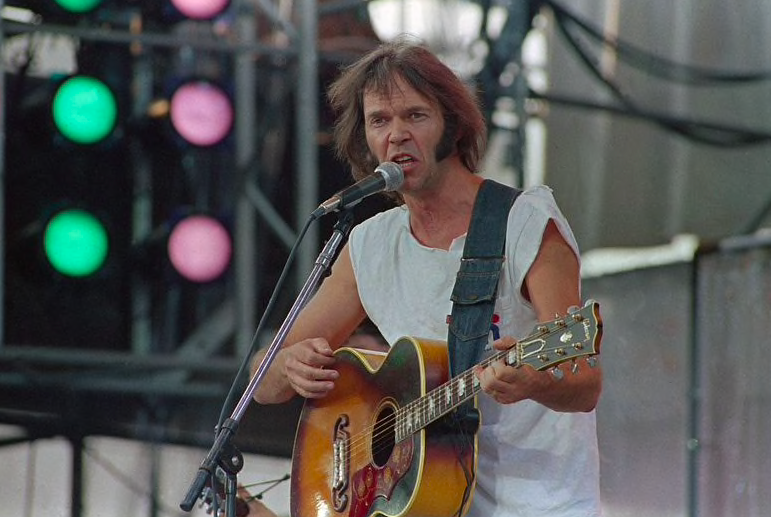How I Like Neil Young: The Albums, pt. 2

Part 1 is here. My handy dandy profoundly subjective numerical rating scheme is decoded here.
Comes A Time (1978) - 9
Rust Never Sleeps (1979) - 10
Live Rust (1979) - 6
Hawks & Doves (1980) - 7
Re*Ac*Tor (1981) - 8
Trans (1982) - 8
Everybody’s Rockin’ (1983) - 3
Old Ways (1984) - 4
Landing On Water (1986) - 8
Life (1987) - 8
Neil’s second decade started with the Harvest sequel he’d been promising his handlers for years - cleaned up, romantic and presentable to “Heart Of Gold” fans (he’d marry the same year). What I long failed to fully appreciate about Comes A Time is how it mixes optimism with hard-earned maturity. "Already One," a love song to his broken family, "Peace Of Mind," a frank commitment to kindness in the face of vulnerability. The capping cover of "Four Strong Winds" gains resonance when you know he's connecting his adult self to the yearning romantic folkie of his youth.
Bursting with critical, commercial & romantic confidence, Neil and Crazy Horse hit the road with a half-acoustic/half-electric revue featuring gigantic amps towering over roadies dressed like Jawas. The album with the 10 next to it is forty minutes of the best unreleased songs from that run: five mostly solo voyages followed by four searing full-band throwdowns. Every song is tight, detailed and darkly humorous - afraid of nothin’ at a time when his peers could be spooked by short hair alone. I’ve had it memorized since middle school. The album with a 6 next to it is seventy minutes of the hits that filled out the setlist, most of which could be found on Decade (though only here does “Cortez The Killer” slip into reggae!). Rent the movie instead so you can see the Jawas.
The belated revelation that his son was born non-oral paraplegic made some sense of his ‘80s output, but at the time Neil just must have seemed really distracted. Hawks & Doves is basically American Stars ‘N’ Bars II, only the psychedelic outtakes are on the A and the country pastiche on the B, with the singer winking at Ronald Reagan instead of Jerry Brown. Re*Ac*Tor reunites Neil with the Horse, perversely sprinkling Synclavier effects over stomps both dumber and scarier than the second half of Rust. Fans of sardonic post-punk crud like Flipper and Pissed Jeans should definitely check it out.
Though his sales had gone south, it wasn’t until he was bouncing around stage strapped to a vocoder that fans really threw up their hands. Due to the horror that met Trans' new wave damage upon release - much of it from his new label Geffen - it’s almost in danger of being overrated today. After all, only half the tracks feature a robot voice - a novelty he tied to the Human League then and trying to communicate with his son later. The rest are from an aborted yacht-rock album. Don’t get me wrong, it’s still a keeper. I just wish people paid more attention to the albums around it.
Neil must have thought he was being a nice guy when he told Geffen he’d make a country album next; who wouldn’t want another Comes A Time? But when his new honchos noted they didn’t have a country promotional department, our miffed hero went and made them a rock’n’roll album. And by that I mean 24 minutes of titles like “Betty Lou’s Got A New Pair Of Shoes” and “Kinda Fonda Wanda.” Pissy troll or earnest tribute? This ad for a MTV giveaway contest suggests Neil somehow found a third option: STOP ASKING, PUT ON THIS PINK BLAZER AND SING “OOH DOOOO WAHHH” ALREADY. I’M PAYING YOU GOOD MONEY.
Understandably unnerved, David Geffen decided it was a troll and sued him for using Geffen’s money to buy people pink blazers (David also might have seen Neil’s long-in-the-making second vanity film, Human Highway, starring Russ Tamblyn, Dennis Hopper and Devo, which suggests what a David Lynch movie would be like if Lynch had spent two decades blowing his ears out on stage instead of studying art). As the lawyers lawyered, the label decided to accept that aforementioned Harvest III: Cokyo Drift. Not done fucking with them (and us), Neil went back to the studio and gave them a country album, complete with singing strings, soppy choirs, star duets and any other hokey bullshit he could think of. Bootlegs from the period, as well as 2011′s archive release A Treasure, suggest this stuff worked better live.
Rather than retire to state fairs as he threatened, Neil finally gave David a rock album, locking session pros Danny Kortchmar and Steve Jordan in the studio and demanding they get that Don Henley sound with Neil’s weedy tech. They failed, but I love the twitchy, enervated outcome - imagine Miami Vice if Crispin Glover was cast as Sonny Crockett.
Headed to (half-empty) arenas for the first time in a while and probably not wanting to pay Steve Jordan’s rate, Neil brought back Crazy Horse, only to make them strap on keytars and syn-drums all nice and mid-’80s like. That tour gave us Life, a slightly softer sequel to Re*Ac*Tor that should have kept people from being shocked when he later said he liked Fishbone & Ministry.
I get why this stuff was poo-poo’d for a while, but with eccentric synth-pop now treasured, these albums deserve a deeper revisit. Ignoring the throwback madness in the middle, Neil’s Geffen period resembles up a second run into the ditch, only instead of trying to shake off his twentysomething blues with booze and the boys, he’s staring down forty, trying to protect his family from threats he barely understands while wrestling with new technology, contradictory political beliefs and a career he can’t control. Lucky for him, Twitter didn’t exist, Warner was ready to have him back, and grunge was about to make him The Godfather.
Part 3 is here.